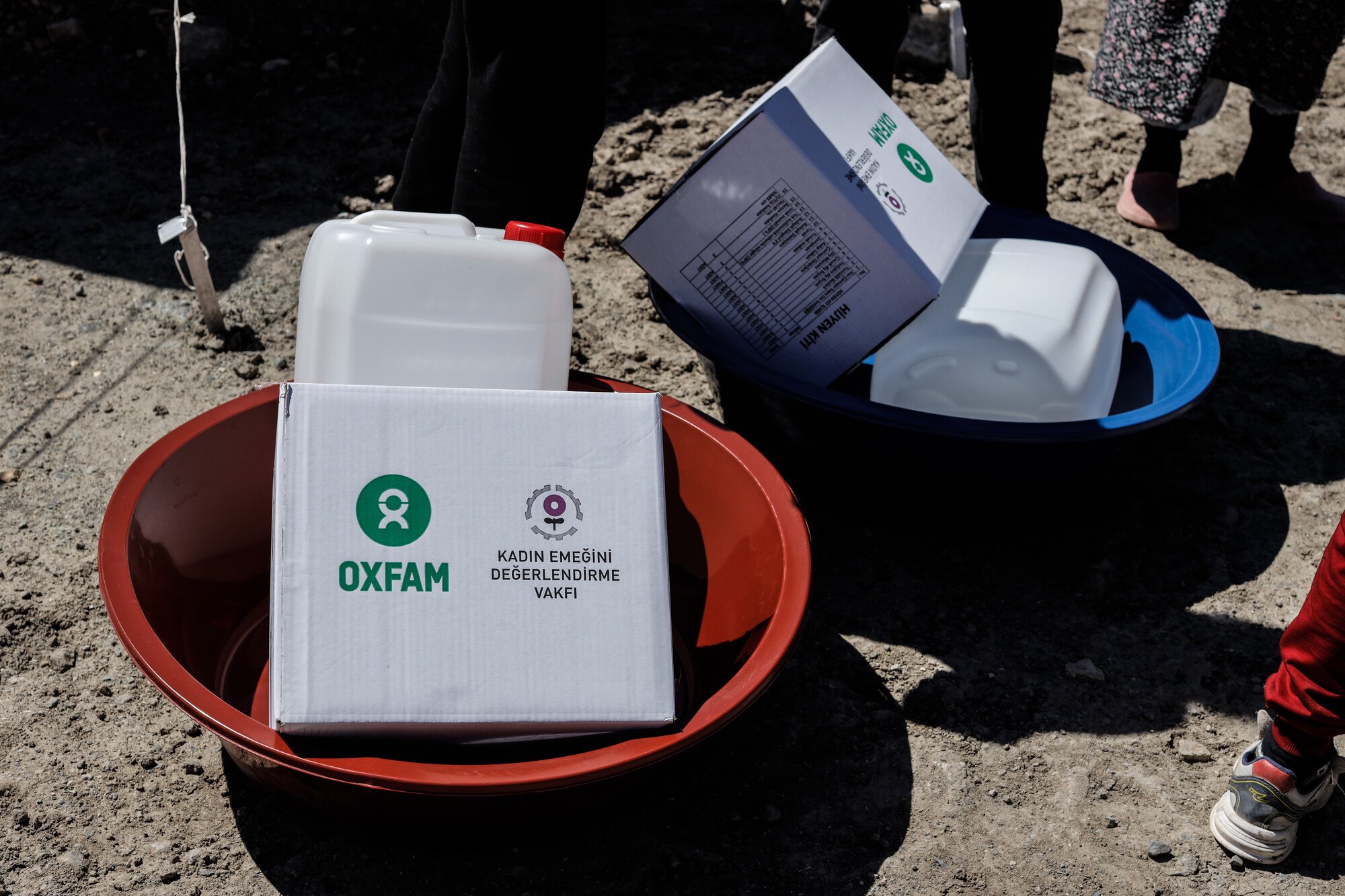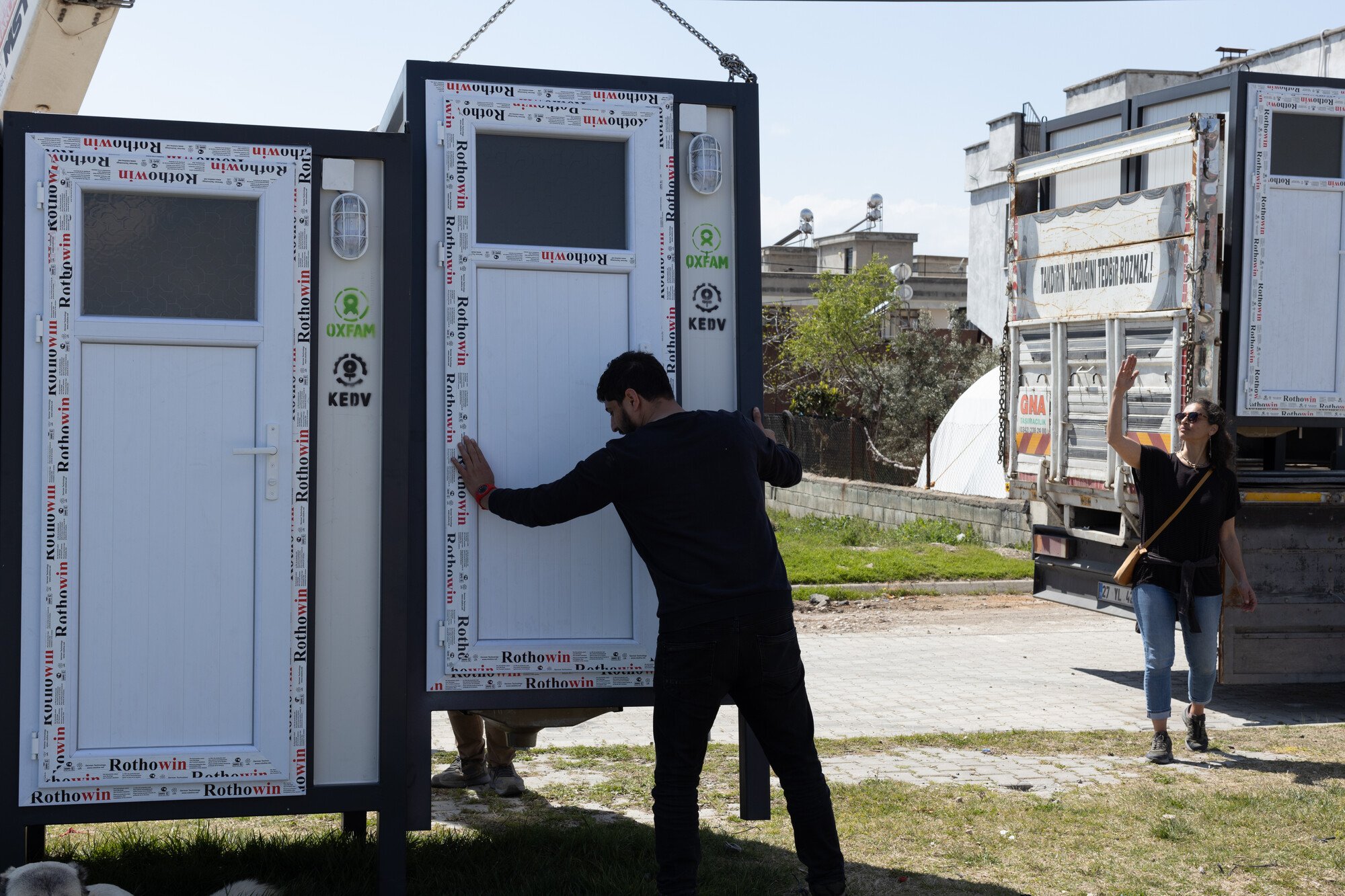Oxfam is working with communities to meet the needs of people displaced by February’s devastating earthquakes, including large numbers of Syrian refugees.
When two powerful earthquakes devastated large parts of southern Türkiye (Turkey) and northern Syria in February, it was the people in the affected communities, as always, who were the first responders.
Among them was Özge Sağaltici, 31, who works for Oxfam KEDV (Oxfam’s affiliate in Türkiye). She was unharmed, but gravely concerned for her parents who lived in the province of Hatay, about a three-hour drive away from her home in Gaziantep.
“Before I arrived, I thought there might just be a bit of damage,” she says. “So, I was shocked by the devastation.”
Some cities and villages in Hatay were virtually flattened. Many of the buildings that didn’t collapse are now riddled with cracks—they will need to be demolished. This destruction has left millions of people across Türkiye homeless. While many of the people displaced from their homes have left the area and are staying with family, more than one million people are either living in overcrowded emergency shelters, or in government-supported tent cities where entire families are having to sleep in one large tent.
Among the survivors most vulnerable to shocks from this emergency are Syrian refugees, who have been migrating to Türkiye for the last 12 years to escape civil war. Türkiye hosts the largest number of refugees in the world, about 3.7 million people. The 11 provinces affected by the earthquake host more than 1.7 million refugees. In Hatay, Gaziantep, and Şanlıurfa provinces, one out of every four or five people is a refugee. Many refugees had successfully established new lives in Türkiye, but are now back to living in temporary housing and relying on assistance until they can get back on their feet.

Working through profound loss
Özge found out her mother and father were safe, and that one of her aunts was rescued from under the rubble. But five other family members were not so fortunate—they died under collapsed buildings.
She decided to stay in Samandağ to support Oxfam KEDV’s emergency response as well as her family, including her elderly grandmother who has mobility issues. Özge is now living in a tent with her parents, two brothers and sister.
“For now, I will stay here because this is where I belong. I grew up here—the people here deserve support and I feel like I’m needed. I’m one of them, so I can understand their feelings and their situation.”
Ozge's support is needed now more than ever as millions of Syrian refugees, who had achieved security from the violence of war, are also feeling the burden of now being displaced for a second time.
Providing earthquake survivors critical support
Oxfam KEDV has worked with both refugee and Turkish communities for years and are reaching those worst-affected by this disaster. Özge is playing a critical role in the response and will continue her coordination work with women’s cooperatives that are part of Oxfam KEDV’s network of partners, to help them get the support they need. She’s also working alongside colleagues to distribute resources such as hygiene kits, which help prevent outbreaks of disease and offer people a sense of dignity. Özge is also helping to train members of the community to support humanitarian response activities.

In the first months after the earthquakes, Oxfam KEDV’s emergency response has reached 24,000 people. This includes providing hygiene kits to 3,000 households, dignity kits (including incontinence pads and bedsheets) to 1,800 people, and menstrual hygiene kits to 7,200 women and girls in Hatay and Kahramanmaraş provinces. The hygiene kits come with a wash tub, a jerry can to store clean drinking water, and a box of toothbrushes, toothpaste, shampoo, washing powder, dishwashing detergent, and towels.

Most of the smaller informal camps have inadequate numbers of toilets and showers that are easily accessible. In this first phase of response, we are meeting immediate needs, such as providing clean drinking water and building toilets and showers. We are also providing food, initially by distributing cooked meals and food kits, and then cash vouchers once people can access shops.
Oxfam KEDV is planning a three-year response. In the long term, we will work with our partners to create job and income-generating opportunities to help people support themselves.
Throughout this long response, people like Özge will be in Hatay. Their work, support, and spirit of hope are crucial to the success of the recovery. “Hatay is a historic place. It’s been destroyed and rebuilt seven times,” Özge says. “I’m very grateful for the support that’s been given so far, but the earthquakes have caused huge damage. It won’t be easy to fix. We will need more human power, and lots of financial support to help us rebuild our lives.”
*This is an update to a story originally written by Lily Partland and posted 5/4



